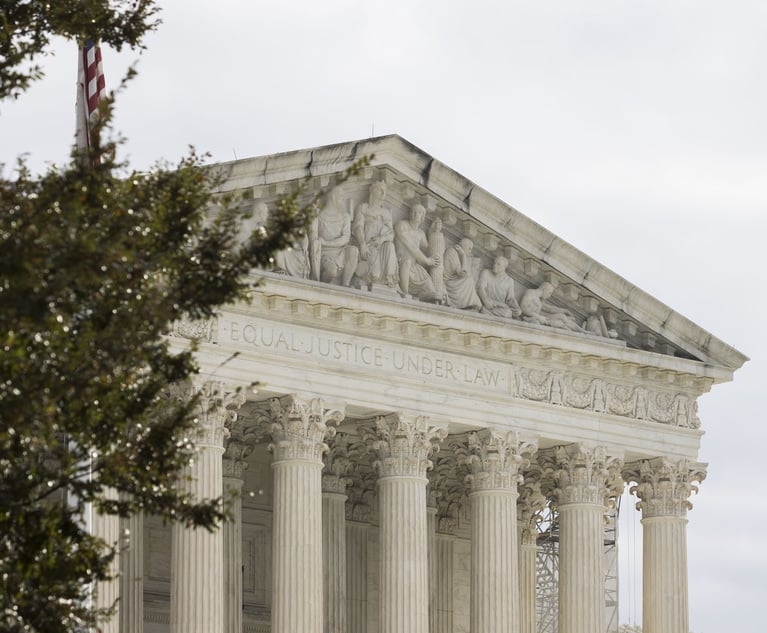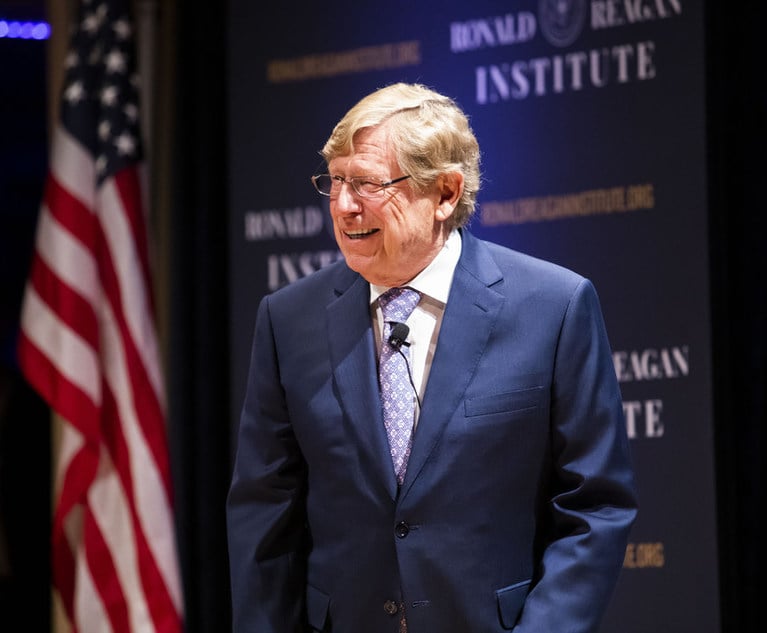Will Precedent Fall in Union Fees Case? Plus, Always a #SCOTUS Angle
“Part of being a good judge is coming in and taking precedent as it stands," Neil Gorsuch said during his 2017 confirmation hearing. Still, the court's newest justice is seen as a likely vote to overturn the court's 41-year-old precedent in Abood v. Detroit Board of Education.
February 26, 2018 at 07:30 AM
6 minute read
A big week lies ahead at the Supreme Court with orders, oral arguments, and even a few decisions coming out. We'll be riding the wave, and reporting on key developments. Today, some looks ahead and back at what the nine robed ones are up to. Let us know what grabs your attention at [email protected] or [email protected].

|
Gorsuch's Thoughts on Precedent
Eyes and ears will be on Justice Neil Gorsuch this morning for arguments on whether the Supreme Court should overrule its nearly 41-year-old decision in Abood v. Detroit Board of Education.
Abood, at the center of the case Janus v. AFSCME, was the unanimous decision upholding the constitutionality of “fair share” fees paid by non-union members to cover their share of the costs of collective bargaining by a public sector union. The challenge in Janus to those fees is on First Amendment speech and association grounds.
Gorsuch is thought to be key to the outcome because the justices deadlocked 4-4 on the same question in Friedrichs v. California Teachers Association in 2016 following the death of Justice Antonin Scalia.
All Supreme Court nominees pay homage to the doctrine of stare decisis—standing by precedent—during their Senate confirmation hearings. They do so without committing themselves to act one way or another when a controversial precedent—usually Roe v. Wade—is the subject of a senator's question.
What did the high court's newest justice say about stare decisis at his confirmation hearing?
“Precedent is like our shared family history of judges,” Gorsuch said. “It deserves our respect.
“Part of being a good judge is coming in and taking precedent as it stands, and your personal views about precedent have absolutely nothing to do with the job of a good judge.”
In deciding whether to overrule a prior decision, Gorsuch said he would look at the age of the decision, how much the country has come to rely upon it, how often it had been reaffirmed, and whether its legal foundation remained firm.
➤➤ Chief Justice John Roberts Jr. said similar things about precedent at his 2005 Senate hearings.
“I do think that it is a jolt to the legal system when you overrule a precedent. Precedent plays an important role in promoting stability and evenhandedness,” Roberts said. “It is not enough that you may think the prior decision was wrongly decided. That really doesn't answer the question; it just poses the question.”
Other factors to consider, Roberts said, include whether the precedent resulted in a system that is workable and whether subsequent decisions have eroded it. And sometimes, he added, overruling an old precedent is “a price that has to be paid.”
Roberts decided that price had to be paid in Citizens United v. FEC in 2010. He devoted his concurring opinion to explaining why he joined the majority in overruling the 1990 decision in Austin v. Michigan Chamber of Commerce, which prohibited corporations from using their treasury funds for independent campaign expenditures.
Former Notre Dame law professor Amy Coney Barrett, now a judge on the U.S. Court of Appeals for the Seventh Circuit, has written that “statutory precedents receive 'super-strong' stare decisis effect, common law cases receive medium-strength stare decisis effect, and constitutional cases are the easiest to overrule.”
➤➤ The Roberts court seems to require “special justification” before it overrules constitutional precedents, according to a study in the New York University Law Review. “Based on our reading of their opinions, special justification for the Roberts justices boils down to (1) reliance interests, (2) workability, and (3) strength of reasoning.”
In the 2016 Friedrichs case, Mayer Brown partner Andrew Pincus, representing a group of constitutional law scholars supporting the union, told the court that “in the 75 years between 1940 and 2015, the court has expressly overruled only 91 constitutional precedents—roughly one case per term. And when it has overturned prior decisions, it has most often done so unanimously or nearly unanimously.”
If the court's 2016 deadlock is any indication, unanimity in Janus may be difficult to achieve.
VIDEO EXTRA!
What's union lawyer David Frederick thinking as he heads into today's arguments? Watch here.
|
#alwaysascotusangle
The recent tussle between University of Pennsylvania Law School professor Amy Wax and the school's dean Ted Ruger made headlines last week. Ruger denied Wax's claim that he urged her to take a leave of absence after she wrote a controversial op-ed column last year in the Philadelphia Inquirer. Wax made the claim in a more recent Wall Street Journal column. Both protagonists have Supreme Court ties. From 1988 to 1994, Wax was an assistant to the U.S. solicitor general, one of the few women arguing regularly before the court during that period. She argued 15 cases. Ruger clerked for Justice Stephen Breyer in 1997 and 1998, and has been a prolific Supreme Court scholar, pioneering the forecasting of Supreme Court decisions and other empirical research on the court. Maybe they can draw from the court's tradition of shaking hands before sessions and work things out…
|
Speaking of Female Advocates…
What a difference a week can make. In last week's four oral arguments, four of the 10 advocates were women. This week, with five arguments on tap, only one of the 13 lawyers is a woman. Among the five women arguing in this cycle, only one is from a private law firm; Kelsi Corkran of Orrick, Herrington & Sutcliffe argued last week in the criminal case City of Hays, Kansas v. Vogt. Pam Karlan, who will argue Tuesday in Lozman v. City of Riviera Beach, Florida, is from academia—Stanford Law School. The other three female advocates are government lawyers.
READ MORE: Why Are There So Few Woman SCOTUS Advocates
|
A Glance Back at Last Week
Textualism and the use—or absence—of legislative history were in play in several Supreme Court decisions handed down last week. And not all of the justices lined up as you might have expected.
Rick Hasen, professor at University of California, Irvine School of Law, explained who landed where and why in a must-read column for Law.com. Two years after Scalia's death, the “battle is not over,” Hasen wrote, adding: “When Kagan declared at a 2015 Scalia Lecture at Harvard Law School that 'we are all textualists now,' she may have been a bit premature.”
Also examining the fallout from the whistleblower case Digital Realty v. Somers is our colleague C. Ryan Barber …. And this analysis by Kleinberg Kaplan, Wolff & Cohen, suggests the decision may not, in the long term, be the victory for employers that some may think.
Are you enjoying Supreme Court Brief? Click here to check out more new briefings from Law.com writers on class actions, intellectual property, employment law, in-house developments … and more!
This content has been archived. It is available through our partners, LexisNexis® and Bloomberg Law.
To view this content, please continue to their sites.
Not a Lexis Subscriber?
Subscribe Now
Not a Bloomberg Law Subscriber?
Subscribe Now
NOT FOR REPRINT
© 2024 ALM Global, LLC, All Rights Reserved. Request academic re-use from www.copyright.com. All other uses, submit a request to [email protected]. For more information visit Asset & Logo Licensing.
You Might Like
View All
Hungary Tries to Beat Lawsuit from Holocaust Survivors
Trending Stories
Who Got The Work
Michael G. Bongiorno, Andrew Scott Dulberg and Elizabeth E. Driscoll from Wilmer Cutler Pickering Hale and Dorr have stepped in to represent Symbotic Inc., an A.I.-enabled technology platform that focuses on increasing supply chain efficiency, and other defendants in a pending shareholder derivative lawsuit. The case, filed Oct. 2 in Massachusetts District Court by the Brown Law Firm on behalf of Stephen Austen, accuses certain officers and directors of misleading investors in regard to Symbotic's potential for margin growth by failing to disclose that the company was not equipped to timely deploy its systems or manage expenses through project delays. The case, assigned to U.S. District Judge Nathaniel M. Gorton, is 1:24-cv-12522, Austen v. Cohen et al.
Who Got The Work
Edmund Polubinski and Marie Killmond of Davis Polk & Wardwell have entered appearances for data platform software development company MongoDB and other defendants in a pending shareholder derivative lawsuit. The action, filed Oct. 7 in New York Southern District Court by the Brown Law Firm, accuses the company's directors and/or officers of falsely expressing confidence in the company’s restructuring of its sales incentive plan and downplaying the severity of decreases in its upfront commitments. The case is 1:24-cv-07594, Roy v. Ittycheria et al.
Who Got The Work
Amy O. Bruchs and Kurt F. Ellison of Michael Best & Friedrich have entered appearances for Epic Systems Corp. in a pending employment discrimination lawsuit. The suit was filed Sept. 7 in Wisconsin Western District Court by Levine Eisberner LLC and Siri & Glimstad on behalf of a project manager who claims that he was wrongfully terminated after applying for a religious exemption to the defendant's COVID-19 vaccine mandate. The case, assigned to U.S. Magistrate Judge Anita Marie Boor, is 3:24-cv-00630, Secker, Nathan v. Epic Systems Corporation.
Who Got The Work
David X. Sullivan, Thomas J. Finn and Gregory A. Hall from McCarter & English have entered appearances for Sunrun Installation Services in a pending civil rights lawsuit. The complaint was filed Sept. 4 in Connecticut District Court by attorney Robert M. Berke on behalf of former employee George Edward Steins, who was arrested and charged with employing an unregistered home improvement salesperson. The complaint alleges that had Sunrun informed the Connecticut Department of Consumer Protection that the plaintiff's employment had ended in 2017 and that he no longer held Sunrun's home improvement contractor license, he would not have been hit with charges, which were dismissed in May 2024. The case, assigned to U.S. District Judge Jeffrey A. Meyer, is 3:24-cv-01423, Steins v. Sunrun, Inc. et al.
Who Got The Work
Greenberg Traurig shareholder Joshua L. Raskin has entered an appearance for boohoo.com UK Ltd. in a pending patent infringement lawsuit. The suit, filed Sept. 3 in Texas Eastern District Court by Rozier Hardt McDonough on behalf of Alto Dynamics, asserts five patents related to an online shopping platform. The case, assigned to U.S. District Judge Rodney Gilstrap, is 2:24-cv-00719, Alto Dynamics, LLC v. boohoo.com UK Limited.
Featured Firms
Law Offices of Gary Martin Hays & Associates, P.C.
(470) 294-1674
Law Offices of Mark E. Salomone
(857) 444-6468
Smith & Hassler
(713) 739-1250









